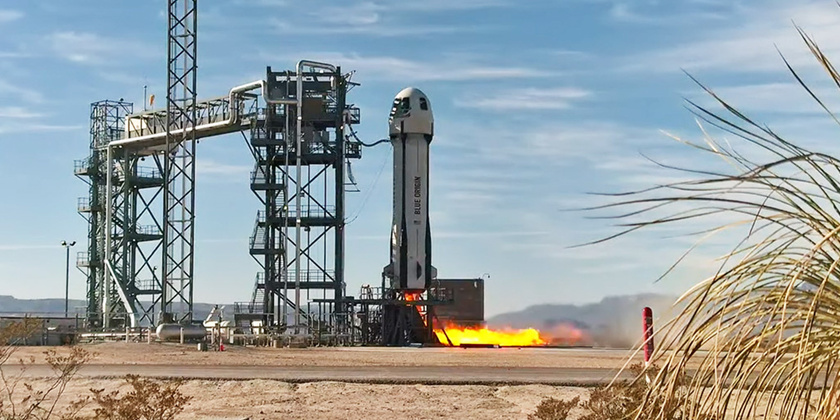Blue Origin's New Shepard mission Tuesday(Feb. 4), successfully simulated lunar gravity, marking a significant milestone in space exploration. The mission tested 29 lunar technology experiments, including resource utilization, dust mitigation, improved living conditions, sensors, small spacecraft, and landing systems.
New Shepard launched at 1600 UTC from West Texas and returned and the rocket's two stages — a booster and a capsule — separated on time a little over 2.5 minutes after liftoff.
The booster came back to Earth for a vertical touchdown on a landing pad a little over seven minutes later, and the capsule followed suit with a parachute-aided touchdown in the dusty West Texas desert around 10 minutes after launch.
The flight went well, however, one of the New Shepard crew capsule's three parachutes appeared not to open fully during descent. But during the company's livestream of the flight, launch commentators stressed that the capsule was designed to land safely with less than three of its parachutes.
Today's launch kicked off Blue Origin's uncrewed NS-29 mission, so named because it was the 29th New Shepard flight to date, and the second for this particular booster(NS5).
“New Shepard’s ability to provide a lunar gravity environment is an extremely unique and valuable capability as researchers set their sights on a return to the Moon,” said Phil Joyce, SVP, New Shepard. “This enables researchers to test lunar technologies at a fraction of the cost, rapidly iterate, and test again in a significantly compressed timeframe.”
Here are key mission statistics actording Blue origin:
Booster Apogee: 104 km AGL / 105 km MSL
Crew Capsule Apogee: 104 km AGL / 105 km MSL.
During the flight, the New Shepard capsule simulated lunar gravity by spinning at approximately 11 revolutions per minute, creating conditions similar to the moon's one-sixth gravity for two minutes during the flight. This is a first for a New Shepard mission, and the capsule achieved this by firing its reaction-control thrusters.
The twist was implemented to serve the mission's 30 research payloads, 29 of which tested "lunar-related technologies," Blue Origin wrote in a pre-flight mission description.
"We are excited to bring our lunar-G capability online. Thanks to NASA for the support. This is an entirely new way to bring lunar gravity to NASA and other lunar technology providers, accelerating their research and tech readiness at a much lower cost. Plus, we can adapt this New Shepard capability to closely mirror Mars and other solar system gravity environments in the future," Blue Origin CEO Dave Limp said in an X post on Jan. 24.
The mission also tested various experiments, including dust mitigation systems, advanced habitation systems, sensors and instrumentation, small spacecraft technologies, and entry descent and landing technologies.
Those technologies can be grouped into six main categories, the company wrote: "in-situ resource utilization, dust mitigation, advanced habitation systems, sensors and instrumentation, small spacecraft technologies, and entry, descent and landing."
More than half of NS-29's payloads were supported by NASA's Flight Opportunities Program, according to Blue Origin. Data about the lunar environment is important to the space agency, which is working to establish a permanent human presence on and around the moon via its Artemis program.
One of the NASA experiments that went up Tuesday, known as the Electrostatic Dust Lofting project, investigated "how moon dust gets electrically charged and lifted up when exposed to ultraviolet light," Blue Origin wrote in the mission description. "Insights from this study will help future lunar missions address dust problems."
Another one, called the Lunar-g Combustion Investigation, studied "how materials catch fire in the moon's gravity compared to Earth's," Blue Origin wrote. "The findings will help NASA and its partners create safer living and working habitats for people on the moon."
The successful simulation Tuesday, of lunar gravity and testing of lunar technologies will accelerate the development of equipment for planetary exploration and commercial missions, paving the way for future lunar missions, including the Artemis program.
New Shepard is named after Alan Shepard, the first American to reach space. (Blue Origin's big New Glenn orbital rocket, which launched for the first time last month, is named after John Glenn, the first American to reach Earth orbit). New Shepard debuted with an uncrewed flight in April 2015. The vehicle's first crewed launch occurred on July 20, 2021, the 52nd anniversary of the Apollo 11 moon landing. Jeff Bezos was on that groundbreaking NS-16 flight, along with his brother Mark, aviation pioneer Wally Funk and Dutch student Oliver Daemen.















